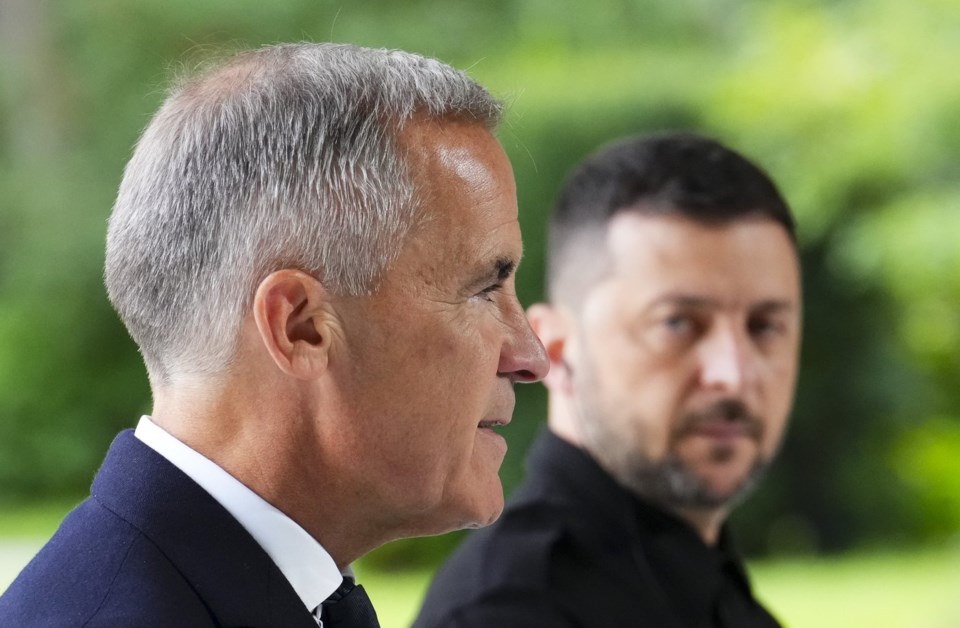OTTAWA — Prime Minister Mark Carney raised more questions than answers about Canada's position when he said he's not ready to rule out sending troops to Ukraine once the war with Russia ends, experts say.
Justin Massie, political science professor at the Université du Québec à Montréal and the co-director of the Network for Strategic Analysis, said Carney’s comments were “very cautious” — and far less clear than that of other allies.
France and the U.K. plan to deploy a multinational brigade once the war ends to deter potential future Russian attacks.
Massie said Carney's comments place Canada in a vague, middle-ground position — not as committed as the French or British governments, but more so than Italy, which wants a security guarantee clause that would let them decide whether to come to Kyiv's aid after the fact.
On Sunday, Carney said that Canada is "working through" security guarantees for Ukraine with its dozens of allies part of the pro-Ukraine "Coalition of the Willing."
"I would not exclude the presence of troops,” Carney said.
But Massie said if Canada is considering putting an eventual troop deployment to Ukraine on the table, there should be a clearer discussion given the enormous stakes and trade offs — especially after decades of underfunding the military, which is now suffering through a recruitment and retention problem and myriad equipment woes.
"If the worst scenario happens where Europe is at war against Russia, we're not ready at all," he said. "I don't think we're raising these questions more than just trying to show solidarity without thinking of the consequences of these choices."
The North Atlantic Treaty Organization's regional defence plans are premised on the United States coming to Europe's aid in a major conflict, Massie said, but U.S. President Donald Trump has repeatedly cast doubt on his willingness to do just that.
David Perry, president of the Canada Global Affairs Institute, said he didn't see the prime minister take a declarative position on potential deployment, and that it remains unclear how the military would sustain a major presence there.
"The cupboard is pretty bare beyond what we have right now," he said. "I think fundamentally to put anything sizable on the ground, we would have to withdraw troops from Latvia, at least in the short term."
Internal Department of National Defence reports have warned that current operational demands have the Canadian Armed Forces stretched thin.
National Defence's annual departmental plan, published in June, cautions that the Canadian Army is "currently at its force generation sustainability limit."
Canada's military already has around 2,000 troops deployed in Latvia, Canada's largest overseas mission, but the army only has some 13,000 deployable soldiers total.
Perry said a small, specialized complement seems much more likely than extensive support, but much would depend on things outside of Canada's control — what changes in the next year and how its allies choose to proceed.
He pointed to various examples of potential contributions, such as providing leadership support and unexploded ordinance disposal.
Defence Minister David McGuinty said on Monday that he's confident the Canadian military would have the capacity to send troops into a postwar Ukraine.
"The prime minister was clear yesterday about the question of having Canadian Forces on the ground. He said that he wouldn't rule it out, and he was speaking in the context of a whole series of possible responses to continue to provide the assistance that we're providing that could play, for example, or take the role of more intelligence support, more logistical support, equipment, financial support," McGuinty said.
"He was speaking in the context of a whole series of possibilities, and that's very difficult to prejudge. We'll see how this evolves over time, but we are hopeful that peace will come."
— With files from Craig Lord in Warsaw, Poland
This report by The Canadian Press was first published Aug. 25, 2025.
Kyle Duggan, The Canadian Press



